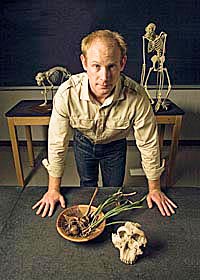Nathaniel J. Dominy, a gifted young anthropologist at the University of California, Santa Cruz, has received a prestigious Packard Fellowship for Science and Engineering from The David and Lucile Packard Foundation, it was announced today (Tuesday, October 9).
The Packard Fellowship, worth a total of $625,000, will support Dominy's pioneering study of human evolution. The fellowship is one of the nation's highest honors for young faculty members. Dominy, an assistant professor of anthropology, joined the UCSC faculty in 2004.
Dominy will receive $125,000 per year for the next five years to support his investigation of the diet and foraging behaviors of hominins, the early human ancestors who lived 2 million years ago. The Packard Foundation awards these fellowships to young scientists and engineers who show exceptional promise and creativity. Dominy is the eighth UCSC faculty member to receive a Packard Fellowship and the first social scientist to be recognized with the honor.
"Nate Dominy's work at the intersection of anthropology, ecology, and genetics is pushing through disciplinary boundaries and generating keen insights," said UCSC Chancellor George R. Blumenthal. "He works at the frontier of knowledge. I am thrilled to see his contributions acknowledged, and I look forward to following the endeavors this support will make possible."
Dominy's research interests center around the acquisition and consumption of food, which he believes fueled the development of bipedalism and big brains. Two of his recent studies made headlines around the world in recent months: The first added compelling new evidence to the hypothesis that hominins may have eaten starchy, nutrient-rich underground plant structures, including bulbs and tubers, while the second revealed that humans are uniquely equipped to digest starch. The revelation that humans have many more copies of the salivary amylase gene than any of their ape relatives bolsters the idea that starch was a crucial addition to the diet of early humans, and that natural selection favored individuals who could make more starch-digesting protein.
Dominy is known as a bold and creative researcher, and the Packard Fellowship will allow him to explore compelling ideas about links between foraging and stature, which he believes have value for the study of human evolution. After years spent observing the foraging behavior of pygmy hunter-gatherers in Africa, Dominy suspects that small stature has been an advantage in the cool, humid rainforest, where dense growth requires constant flexing of the hip and knee and where smaller body size would reduce heat loss. In other words, being small could be an evolutionary asset rather than a detriment.
"The classic hypothesis is that short stature is the result of poor nutrition, but then you'd expect to see people of short stature in other habitats where the food supply is limited, like the western desert of Australia," said Dominy. "Instead, short stature has arisen multiple times in rain forests, in Indonesia and northern Australia, as well as in Africa. That makes me think something else is going on."
Dominy will study 11 pygmy populations around the world, including the Mbuti of the Democratic Republic of Congo and the Biaka of Cameroon, to study the biomechanics and metabolic costs of locomotion. He will use high-tech tools, including video-based motion analysis, thermographic imaging, and a telemetered heart rate and gas exchange analyzer, in his investigation of why natural selection may have favored short stature in the region. By analyzing DNA gathered in the field, he hopes to learn more about the molecular mechanisms that regulate human stature. The results will shed light on the selective advantages of stature and help estimate the timing of shifts in the evolution of these populations. They will also advance molecular genetics by improving understanding in ways that may generate medical treatments targeting the growth hormone pathway.
An interdisciplinary scientist, Dominy's long-term goal is to bridge the gaps among evolutionary theory, tropical ecology, and molecular genetics. "It's difficult to find support for this combination of genetics, biomechanics, and tropical ecology, because the gap among these disciplines is large," said Dominy,
Dominy will pursue the investigation of stature with Erin E. Butler, a biomechanical engineer at the Lucile Packard Children's Hospital at Stanford University.
Additionally, two UCSC graduates were among the 20 fellowship recipients announced today: Andrew D. Jacobson, an assistant professor of Earth and planetary sciences at Northwestern University, earned a bachelor's degree in earth sciences and chemistry in 1996. And Adam C. Siepel, assistant professor of biological statistics and computational biology at Cornell University, earned a Ph.D. in computer science from UCSC in 2005.
#####
Editor's Note: For additional background on Dominy's research, see:



